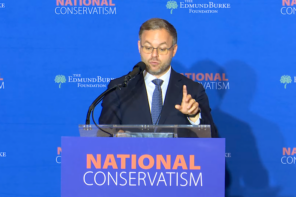Ten Questions for Jay Wexler on Holy Hullabaloos: A Road Trip to the Battlegrounds of the Church/State Wars, due out by Beacon Press in June 2009.
What inspired you to write Holy Hullabaloos? What sparked your interest?
I’d always wanted to write a kind of fun, non-academic book about church/state issues, and once I got tenure it seemed like the right time. The road trip aspect of the book, however, was not part of the original plan. That idea came to me while I was reading Sarah Vowell’s amazing Assassination Vacation, where she talks about her various trips to places connected to the assassinations of different presidents. I had just finished reading some other funny road-trip books like Steve Almond’s Candyfreak, and all of a sudden it occurred to me that maybe I should get out of my stuffy office and hit the road, see what I could learn by visiting the places where these church/state cases I’d been teaching about for so long actually happened.
What’s the most important take-home message for readers?
I think the overall biggest take-home message for readers is that it is both possible and desirable to, as Alan Wolfe says in his blurb for the book, “tone down the anger” on these contentious church/state issues. It’s possible for people with very different beliefs (and non-beliefs) to talk about religion without getting pissed off at each other. I think humor helps a lot.
Anything you had to leave out?
One of my hobbies is painting, and for the book I had painted a ridiculous portrait of Justice Samuel Alito with a small green bunny sitting on his shoulder. I included the painting in the first draft that I turned in, and I think it was the very first thing my editors cut. According to them, there should be exactly zero paintings of Justice Alito with a small green bunny on his shoulder in the book. But it’s on the book’s Web site if you want to see it, along with various other footnotes and paragraphs that my wise editors made me cut.
What are some of the biggest misconceptions about your topic?
There are so many. One of the biggest ones is that the Supreme Court has banished religion from public life by banning school prayer and the like. This is absolutely not true. Private individuals and organizations can say whatever they want in the public square about religion. Students can pray in the schools. It’s just that the school itself can’t participate in the prayer; it can’t draft the prayer or encourage the prayer or lead the prayer. But if students want to get together before class or after school or at recess or whenever to pray, they can.
Did you have a specific audience in mind when writing?
I was hoping to write a book that would be attractive to all sorts of people who are interested in religion, law, politics, education, etc. Two particular groups I hope will read the book are atheists and other nonbelievers who don’t like religion, because I want to try to persuade them that we (and I myself am an atheist) should respect religion, and religious believers who don’t like atheism, because I want to persuade those believers that atheists deserve their respect as well.
Are you hoping to just inform readers? Give them pleasure? Piss them off?
I want readers to have so much fun reading the book that they don’t realize that they are learning a ton about church/state law at the same time. I’m sure some people will be pissed off by some of the things I say, but that was not my intention.
What alternate title would you give the book?
The entire time I was writing the book I thought the title was going to be Free Exercise, Expensive Gas: A Church-State Road Trip. I still like that title, though I like Holy Hullabaloos better. Another alternative was Everything You Need to Know About Church/State Law Except for Those Things You Need to Know But Aren’t Covered. My editor said that title would remind people too much of the 70s.
How do you feel about the cover?
I love the cover. Or at least I should say I love the picture that is on the draft of the cover. I haven’t seen the final cover yet. I’m hoping and expecting to love that one too.
Is there a book out there you wish you had written? Which one? Why?
Yikes, about a thousand or so I’d guess. One that comes to mind because I recently re-read it is Then We Came to the End by Joshua Ferris. Brilliant, hilarious, moving, and written mostly in the first person plural.
What’s your next book?
Either a book called The Odd Clauses: Twelve Parts of the Constitution You May Not Know About But Should, about some of the really weird and obscure but yet important provisions of our founding document, or a novel about a Supreme Court Justice who converts to Taoism in the middle of the most important term in recent history, with zany results!




